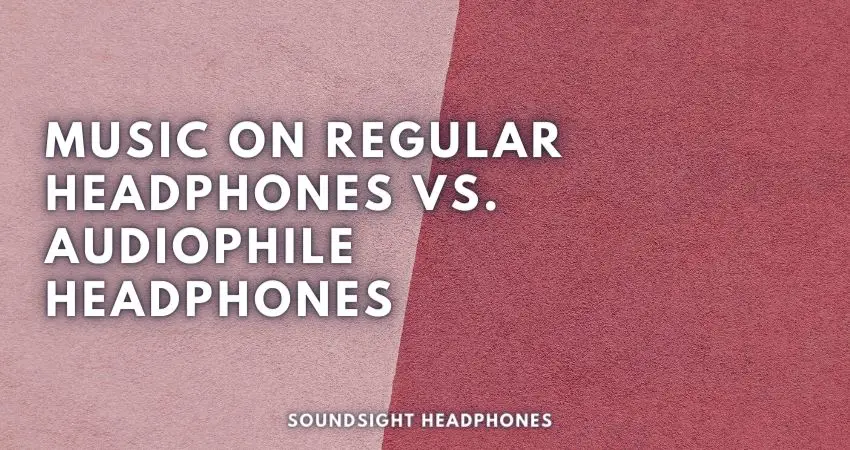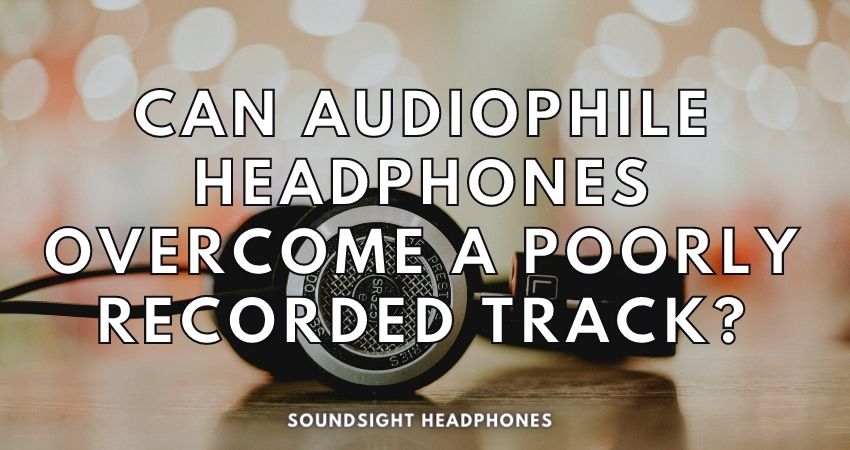A frequently asked question is whether audiophile headphones are able to compensate for a poorly recorded track. One theory argues that the quality of the headphones is all that matters when listening to music. On the other hand, it is impossible, even for high-fidelity headphones, to compensate for a badly recorded track. So, which theory is true, and how do audiophile headphones perform in the face of a subpar recording?
This article is about whether audiophile headphones can improve a bad recording and make for more exciting and enjoyable listening. If you’ve ever wondered whether audiophile headphones are worth buying even when paired with inferior tracks, then you should read on.
Audiophile headphones cannot make bad tracks sound better – Here’s why
Audiophile headphones do not improve badly-recorded or poorly composed and mixed songs. There are plenty of audio flaws and effects peculiar to poorly recorded songs that become more apparent with good-sounding headphones. But just because these headphones play music well, that doesn’t mean they can make a bad track sound better.
Reveal the imperfections of the audio
A poorly recorded track sounds muffled, muddy, lack clarity, the instruments or vocals feel off, has distorted sound, background noise, etc. These flaws, whether they’re distortions, vocals sounding muffled, loud plosives, or music being compressed, are better highlighted, which can make listening to old songs unbearable.
Audiophile headphones have a more melodic and colorful sound signature than studio headphones, but they are still critical to detail and nuance, revealing many audio cues. Some add a nice touch to the music, but in the case of bad songs, these aspects don’t make the listening experience enjoyable. Therefore, you cannot overcome a badly recorded track using audiophile headphones.
Suppose a song is poorly recorded and the track has a noise floor or hiss. In that case, audiophile headphones reproduce all these details, in addition to the sound distortion of the headphones themselves, which in the case of audiophile headphones is much lower than in conventional headphones.
Don’t fit the musical genre
Some songs are designed to create hype and excitement in people and may sound better with a little more bass than usual. More bass is not an indication of good music but makes listening to music with a pair of headphones with a full-bodied sound signature sound more exciting and energetic.
The same music will sound a little lifeless, dull, or too “clean” with audiophile headphones because they don’t focus as much on bass extravaganza or fun audio tuning. This doesn’t mean you cannot enjoy a large variety of genres, but rather that audiophile headphones do not try to make the song sound better. Instead, they focus on a good overall balance with a balanced sound signature.
Naturally, electronic music, techno, house, and drum’n’bass are music genres that instill a lot of energy into their tracks without as much finesse or flavor. Additionally, songs of these genres of music are more badly produced because they’re electronically generated and the easiest music to produce. Everybody has access to a DAW these days and is free to experiment and make mistakes. It’s hard to produce good music of any genre, but the bar for good music is not high here.
In short, most audiophile headphones are better with specific genres of music. They give you a more accurate experience, but they don’t fit the style of certain music genres like electronic, EDM, or bass-heavy music. To some extent, this is not a bad thing: A bass-heavy song will be able to sound more detailed on a pair of audiophile headphones, but the song won’t have the same energy or impetus.
Are audiophile headphones worth it?
High-fidelity audiophile headphones reveal the good and the bad in your music. When you listen to properly recorded music, you can enjoy subtle musical notes and nuances that complement the songs. As such, if you have the money and good music in high-resolution audio formats, you may find it rewarding to invest in a set of audiophile headphones.
Audiophile headphones become unnecessary when your musical tastes don’t match the full potential of your system. Suppose you listen to music genres that lack complexity, such as mainstream pop, generic rock, indie, or digitally produced music. In that case, audiophile headphones don’t perform to their best ability as they do when playing acoustically recorded music from high-quality sources.

Listening to bad music on regular headphones vs. audiophile headphones
It may sound absurd, but listening to a poorly recorded track or remix with regular headphones doesn’t sound as awful as with audiophile headphones.
You can’t hear the artist licking his lips while recording near the mic with ordinary headphones, which is great if you listen to that old-school song you love. You also can’t hear the extra breath in the vocal track or the lack of mixing techniques.
Consumer headphones are not affected by bad music
If you listen to a poorly recorded song with normal headphones, you can’t hear the terrible sound because it’s overwhelmed by the bad sound reproduction of the headphone’s dynamic drivers. That reads funny, but you know what I mean. Anyone who has ever heard a song on two different headphones knows what I mean.
Another positive aspect of mainstream headphones is that you don’t need to buy additional audio equipment or a subscription for high-resolution music. You can enjoy music from YouTube without any problem; the automatic audio compression won’t bother you! You can also listen to music on your smartphone without needing an amplifier or uncontrollably indulging in an expensive hobby, as most audiophiles do.
Audiophile headphones should play only high-quality music
With high-fidelity headphones, poor recording materials, and awful mixing and mastering practices that ruin the song come to light. On the other hand, buy quality audiophile headphones, and it’s time to pull the AMP/DAC combo out from under the covers, grab a few FLAC files from the Internet, and refresh your ears with some delectable music.
You cannot go wrong with a nice audio setup, good music in high-res audio formats, and an audiophile headphone with a detailed sound, nice bass response, and clarity. That combination will make your music listening experience pure bliss.
FAQ
Can some music sound better with regular headphones than with audiophile headphones?
Objectively, most songs sound better with audiophile headphones, while only a few poorly recorded songs sound better with ordinary headphones.
Audiophile headphones require a type of music to enjoy them thoroughly, whereas regular headphones can be used to listen to less polished and refined music. It depends on the headphones’ sound quality and the track or album itself. LINK HERE
Audiophile headphones are both a blessing and a curse, as they reveal many details that you would sometimes rather not hear and have a more exciting sound than studio headphones.
Conclusion
Needless to say, you cannot enjoy a poorly recorded song with audiophile headphones. It can’t overcome a poorly recorded track because it amplifies its flaws in the recording.
Audiophile headphones are better for most applications – they do sound much better than ordinary headphones, even for day-to-day audio content, but cannot fix a poorly recorded track and make it sound better.
Audiophile headphones are hard to distinguish from regular headphones by looking at them, but they sound utterly different. They are worth it only if you care about music and want to get the best sound quality possible.
Even if audiophile headphones are better than regular headphones for content consumption, their increased clarity can add too much auditory information and sometimes make badly edited YouTube videos or podcasts sound unpleasant.
